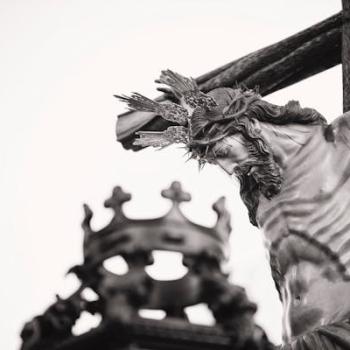“It is sometimes an appropriate response to reality to go insane.” Philip K Dick
To be deemed insane, and therefore to have one’s ideas entirely rejected because of one’s failure to “grasp reality,” has become one of the great phobias of modernity. Positivistic rationalism with its absolute faith in human reason and its ability to comprehend the mysteries of the universe abhors the insane because they remind us of the frailty of humanity. The insane have always served to counter human exceptionalism. In other eras, though the insane were difficult to deal with, they were also appreciated because they were seen as those who touched upon sacred and holy mysteries and so deserved respect. They did not have to understand that which they communed with; the fact that they were in communion with the sacred gave them their position of respect. They disturbed humanity just as much as they were disturbed. They showed us that there was more to the real than the frail simulacra of the real preserved by human knowledge. They were to be treated with honor because those whom the holy invades must be respected; holy fools were prophets, and those who ignored them did so at their own peril.
Marsilio Ficino, in his commentary on the Phaedrus, explained that an experience of the divine glory could bring the one who experiences it into such a frenzy that they are alienated from society by transcending it:
Divorced from human studies, however, and adhering to the divine, he is thought by the multitude to be as it were mentally disturbed; but he himself, being filled with the god, is unknown to them. So the whole speech concerning the fourth frenzy tends to this: that he who has seen something of beauty here, in recalling the true Beauty, receives his wings, and having received them, attempts to fly. But since he cannot do this, gazing upwards like a bird at the supernals and despising lower things, he receives the [crowd’s] verdict that he has been seized as it were by a frenzy. This divine alienation is the best of all alienations, therefore, and comes from the best, and such is true both for those who have it and those who participate in it; and the person who is seized by this frenzy, since he loves beautiful things, is called a lover.[1]
Post-modernism, because of its denial of the absolute authority of human reason, has opened the way for the insane to once again offer their wisdom to society, to allow them a place in the world of ideas. It is therefore of no surprise that Philip K Dick has become one of the leading oracles post-modern philosophers turn to as they explore the complexities of the real. Dick, whose imagination and brilliance can be seen throughout his writings, found his mind and life entirely disturbed by experiences which unhinged what little sanity he had left. He encountered something strange, something weird. Some of what he experienced was beautiful, much more was terrifying and dark. He saw the darkness and the light, the horror and the release, and he was transformed because of it:
Have your young men seen visions and our old men dreamed dreams? Nightmare dreams specifically, about a world of enslavement and evil, of prisons and jailers and ubiquitous police? I have. I wrote out those dreams in novel after novel, story after story; to name two in which this priory ugly present obtained most clearly I cite The Man in High Castle and my 1974 novel about the United States as police state, called Flow My Tears, The Policeman said.
I am going to be very candid with you: I wrote both novels based on fragmentary residual memories of such a horrid slave state world — or perhaps the term ‘world’ is the wrong one, and I should say ‘United States,’ since in both novels I was writing about my own country.[2]
His experiences made him wonder about who he was, what the universe was, and even about the nature of the one who created the world. He offered many intriguing interpretations; they held the facts in common, and shared many of the same exegetical insights, and yet they differed greatly from one another, such as when he suggested that the universe was a kind of purgatory where we are re-living our lives so as to overcome the mistakes we made in them, or as when he looked at the universe as a mere computer program run by a failing machine, requiring all within it to be transferred into a new machine. He didn’t have answers, but he knew there was something vital he came to know and he had to share it with others. He had gained wisdom and insight he should not have had, and he didn’t know what he could and should do with it. His writings were his primary means by which he could share them with others, letting them in on the challenge, letting them pursue their meaning. We don’t have to agree with the theological interpretations he offered to them to recognize the holiness of his experiences, and therefore, to recognize that something in those experiences needed to be shared, something in it was a divine warning to us, a warning which needs to be heeded, now more than ever, for the empire never ended:
To fight the Empire is to be infected by its derangement. This is a paradox: whoever defeats a segment of the Empire becomes the Empire; it proliferates like a virus, imposing its form on its enemies. Thereby it becomes its enemies.[3]
[1] Marsilio Ficino, Commentaries on Plato. Volume I: Phaedrus and Ion. trans. Michael J.B. Allen (Cambridge, MA: The I Tatti Renaissance Library, 2008), 17 – 19.
[2] Philip K Dick, “If You Find This World Bad,” in The Shifting Realities of Philip K Dick. ed. Lawrence Sutin (New York: Vintage, 1995), 244-5.
[3] Philip K. Dick, VALIS (New York: Vintage Books, 1991), 235.
















